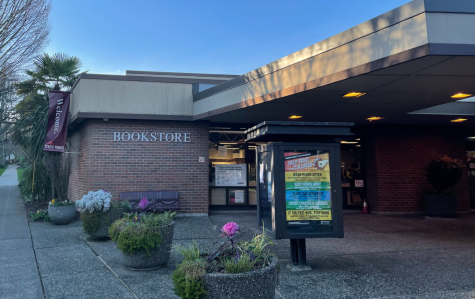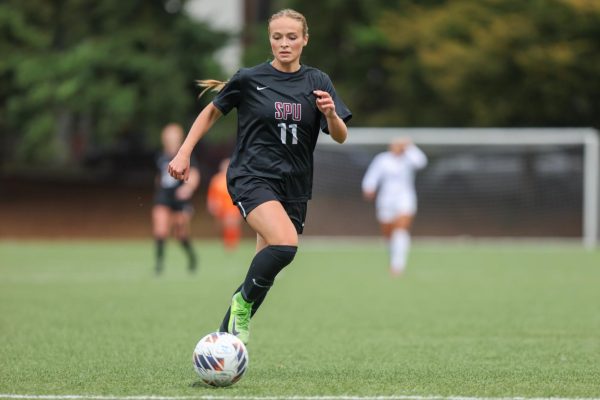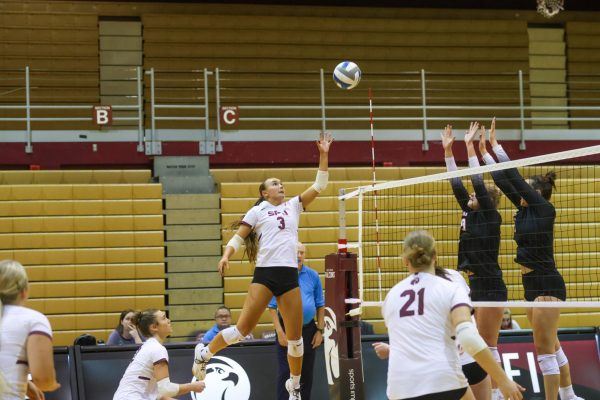Late books, struggling students
Students, faculty find creative solutions amidst bookstore delays
January 26, 2022

Class continues on at Seattle Pacific University despite major delays from the university bookstore. Many students found themselves awaiting orders of academic materials despite ordering in advance of the quarter beginning.As the bookstore struggles to fulfill orders in a timely manner, students and faculty are working through any issues that may arise.
First-year physiology major Alec Green expressed his frustrations with the delays of his bookstore order, as well as some of the challenges he had to overcome.
“I still didn’t have my books and I needed them for an assignment in my class, so it made it very hard to do homework. I had to go to the bookstore itself and buy my books,” Green said. “I tried to find online versions of the books, and I looked on Amazon and stuff for alternatives, and all of them were just not exactly what I needed or I had to pay for it.”
First-year music therapy major Ana Burres expressed concerns over the quality of education and her wishes for a low-cost, long-term rental system from the university.
“I have already noticed a few people that have fallen behind in their work due to not having a book that came from the bookstore. I think if that continues, it’s going to be detrimental to learning. Students are going to fall behind,” Burres shared. “I think that it would be helpful to have certain textbooks available to borrow from the library. You should be able to take long term rentals from the library for close to nothing.”
Associate professor of economics Geri Mason shared the solutions that have best allowed her students to continue their learning despite lacking access to materials.
“I use an e-book to ensure that students can get instant access. The publisher allows students two weeks of courtesy access, giving students time to wait for shipping and other types of delays,” Mason said. “I try to remain flexible and creative, especially in the first two or three weeks of the quarter. If I am prepared for the usual obstacles to the start of any quarter, my students can progress in their learning uninhibited.”
Assistant professor of English and writing Jeffrey Overstreet shared the effects bookstore delays have had on his students.
“In my fiction workshop for example, the class was in the process of buying textbooks for the class even after the class had begun, and I received an email saying a particular book is out of stock. Now I’m in a tough situation because half the class has the book and half the class doesn’t, and the bookstore can’t get more,” Overstreet said. “Do I still require the rest of the class to buy the book from somewhere else? It is very disruptive and I have to keep revising my syllabuses to give students a chance to obtain the necessary resources.”
Associate professor of classical languages and civilizations Owen Ewald shares his hopes for more accessible materials moving forward, and shares some steps taken by the university to increase access of materials for students.
“For the future, I hope that a combination of open-source textbooks and making materials available in electronic and paper formats will make textbooks easier to obtain without forcing all reading to take place on screens,” Ewald said. “The university is giving grants and technical support to some open-source book projects by its own faculty in several disciplines this academic year. The bookstore this year has asked me about open-source resources every time I ordered books.”
Some students still prefer the convenience of the university bookstore, despite often higher pricing and potential delay.
“I will probably still use the bookstore, price dependent,” Green shared. “Being able to go into Banner and there is just one button you click that is ‘buy my books,’ and it has everything listed is extremely convenient even if it is more expensive.”
On Tuesday, Jan 11., Director of University Services Alexis Cruikshank sent an email to the SPU community regarding the delays. Cruikshank cited technical issues and suggested students shop in-person or purchase digital materials. Three days later, another email was sent out announcing a bookstore closure on Jan. 15 due to staffing shortages.
Overstreet expressed hope for a lack of delays and supply chain issues in the future, as well as some of the changes he has made to his courses.
“I hope these problems resolve as COVID issues improve, and supply chain issues improve, but it’s hard to say. I know the bookstore staff are working hard, and I’m learning to design my courses, increasing my use of the library and e-books, so that late textbook deliveries aren’t so disruptive,” Overstreet shared.
Many industries are experiencing staffing shortages currently, causing issues for some businesses. Green shared his thoughts on the potential for future delays and staffing shortages.
“I don’t think it will be an isolated incident because staffing issues are not only related to COVID, there’s so many other things that cause them,” Green said. “I think it will definitely happen again. If not next term, sometime in the future,”
For more information about the SPU bookstore or to order materials, please visit https://spu.bncollege.com/


























































































